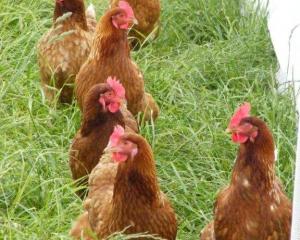
Mrs Roy said her family had been vendors at the Balclutha Cattle Sale for as long as she could remember.
She was the third generation on the 650ha sheep and beef and dairy grazing farm Bushbury Farms in Tuapeka Mouth.
The family were the vendors who offered the most cattle at the sale last week.
All of their 69 steers sold.
A dozen Hereford and Friesian cross steers, weighing 392kg on average, sold for $1460 each.
The next lot to sell were 32 Murray Grey cross steers, weighing 401kg on average, for $1430 each.
A pen of 19 Speckle Park steers, weighing 398kg on average, sold for $1460 each.

They offered more cattle than usual at the sale this year to ensure there would be enough grass available to produce baleage for the dairy grazing arm of their operation.
More cattle were sold this season to cover rising on-farm costs and service debt.
"It has been a hard year for farming and we are not carrying over the stock numbers we usually do."
Of the 56 lots offered at the sale, 54 sold including a top price to vendor Bruhns Farm for a pen of 10 Hereford and Friesian cross steers, weighing 611kg on average, for $2100 each.
Beef + Lamb New Zealand released its annual stock number survey last week which showed a notable decline in both sheep and cattle numbers as of June 30.
National sheep numbers were estimated to have decreased by 4.3%, down to 23.31 million, with breeding ewe numbers falling by 2.9% and trading sheep stock numbers down 7.9%.
Beef cattle numbers were down 2.8% overall, most significantly in the South Island where drought led to a 7.1% decrease.

Beef cattle numbers dropped 6.6% in Otago and increased 5.1% in Southland, the survey said.
In a statement, B+LNZ chairwoman Kate Acland said this year had been particularly tough for sheep and beef farmers as the combination of drought across many parts of the country, high costs and low sheep prices had put immense pressure on them.
The report indicated that while there may be a partial rebuild of stock numbers in some regions in the coming season, the full recovery of sheep numbers to pre-drought levels was unlikely, due to ongoing land use change into carbon forestry.
The number of beef cattle might recover more quickly as prices have remained strong for beef and farmers have been switching from sheep to cattle.
In the last three years, there was a 10% decline in sheep and beef numbers, a major driver being the conversion of sheep and beef farms into forestry due to the Emissions Trading Scheme and high carbon prices, she said.
While sheep numbers had been declining slowly, afforestation had accelerated that sharply and also driven down cattle numbers.















